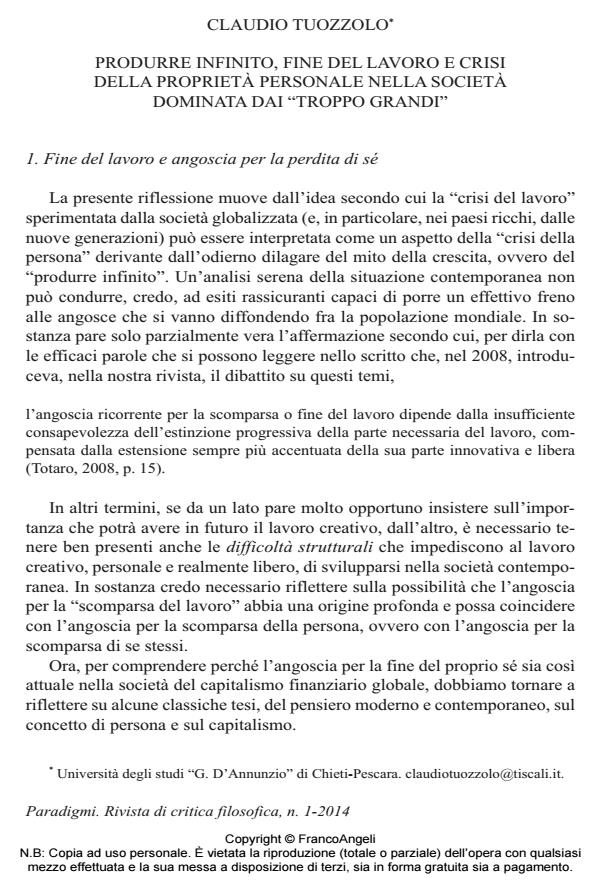Produrre infinito, fine del lavoro e crisi della proprietà personale nella società dominata dai "troppo grandi"
Titolo Rivista PARADIGMI
Autori/Curatori Claudio Tuozzolo
Anno di pubblicazione 2014 Fascicolo 2014/1
Lingua Italiano Numero pagine 24 P. 51-74 Dimensione file 543 KB
DOI 10.3280/PARA2014-001004
Il DOI è il codice a barre della proprietà intellettuale: per saperne di più
clicca qui
Qui sotto puoi vedere in anteprima la prima pagina di questo articolo.
Se questo articolo ti interessa, lo puoi acquistare (e scaricare in formato pdf) seguendo le facili indicazioni per acquistare il download credit. Acquista Download Credits per scaricare questo Articolo in formato PDF

FrancoAngeli è membro della Publishers International Linking Association, Inc (PILA)associazione indipendente e non profit per facilitare (attraverso i servizi tecnologici implementati da CrossRef.org) l’accesso degli studiosi ai contenuti digitali nelle pubblicazioni professionali e scientifiche
È utile sviluppare oggi una «sociologia economica comparativa» (sul modello di quella delineata dal giovane B. Croce) per analizzare le ‘sorti dell’uomo’. Nella società contemporanea, il «lavoro vivente», mercificandosi, si trasforma sempre più in semplice mezzo del puro guadagno. Ma la mercificazione del lavoro non è che uno degli aspetti della mercificazione di tutti i valori. A causa della mercificazione totale i due più tipici valori ‘borghesi’, il lavoro e la proprietà, entrano in crisi nella società globalizzata dominata dalla ‘ricchezza impersonale’, ovvero dal capitale finanziario (gestito non più da uomini, da imprenditori in carne ed ossa, ma da ‘funzionari del guadagno fine a se stesso’: i manager). Le politiche economiche negli ultimi trent’anni hanno favorito il «finanzcapitalismo» ovvero «i troppo grandi per fallire» (L. Gallino), colpendo l’industria, il lavoro e la proprietà, e favorendo il diffondersi del mito del guadagno infinito e del PIL. Si sta perciò realizzando l’ideale morale dell’etica del capitalismo (il guadagno come unico scopo ultimo) ovvero quella «inversione» del ‘naturale’, pensata da Weber sulla base del concetto kantiano di ‘persona’;
Keywords:Proprietà personale, etica del finanzcapitalismo, lavoro, troppo grandi per fallire, ricchezza impersonale.
- Croce B. (1900a). Materialismo storico ed economia marxistica. Saggi critici. Milano-Palermo: Remo Sandron.
- Bauman Z. (1998). Globalization. The Human Consequences. Cambridge-Oxford: Polity Press (trad. it.: Dentro la globalizzazione. Le conseguenze sulle persone. Roma-Bari: Laterza 2007).
- Croce B. (1896a). Sulla concezione materialistica della storia. Napoli: Tipografia della Regia Università (estratto dal vol. XXVI degli Atti dell’Accademia Pontaniana).
- Croce B. (1896b). L’arte, la storia e la classificazione generale dello scibile. In: Il concetto della storia nelle sue relazioni col concetto dell’arte. Ricerche e discussioni . Roma: Loescher: 117-132.
- Croce B. (1897a). Le teorie storiche del prof. Loria. Napoli: R. Tipografia Francesco Giannini & Figli (già in traduzione francese in: Le Devenir Social, II (1897): 881-905, con il titolo: Les théories historiques de M. Loria).
- Croce B. (1897b). Per la interpretazione e la critica di alcuni concetti del marxismo. Memoria letta all’accademia Pontaniana nella tornata del 21 novembre 1897 dal socio residente Benedetto Croce. Napoli: Stab. Tipografico della R. Università (estratto dal volume XXVII degli Atti dell’Accademia Pontaniana); ed. francese:
- Essai d’interprétation et de critique de quelques concepts du marxisme. Le Devenir Social, 1898: 97-126 e 233-50. Croce B. (1898). Recenti interpretazioni della teoria marxistica del valore e polemiche intorno ad esse. Estratto dalla Riforma sociale, VI, 5 (volume IX) – Seconda serie (Torino: Ruox Frassati e Co).
- Croce B. (1900b). Materialismo storico ed economia marxistica. Ora in: Rascaglia
- M. e Zoppi Garampi S., a cura di, note al testo di Craveri P., 2 voll., Napoli: Bibliopolis, 2001.
- Croce B. (1951). Primi saggi. Bari: Laterza.
- Gallino L. (2011). Finanzcapitalismo. Torino: Einaudi.
- Kant I. (1785). Grundlegung zur Metaphysik der Sitten. Ora in: Kant’s Gesammelte Schriften, Abtheilung I: Werke, Bd. IV. Berlin: Georg Reimer, 1911 (trad. it.: Fondazione della metafisica dei costumi. Torino: Paravia, 1923).
- Marx K. e Engels F. (1894). Das Kapital, III. Ora in: Werke, Bd. 25. Berlin: Dietz, 1964 (trad. it.: Il Capitale, III. Roma: Editori Riuniti, 1980).
- Rifkin J. (1995). The End of Work. The Decline of the Global Labor Force and the Dawn of the Post-Market Era. New York: G.P. Putnams sons (trad. it.: La fine del lavoro. Milano: Baldini e Castoldi, 1995; poi Roma: Gruppo Editoriale L’Espresso, 2007).
- Sraffa P. (1960). Produzione di merci a mezzo di merci. Torino: Einaudi.
- Totaro F. (2008). Presentazione. Paradigmi, XXVI, 1: 8-14.
- Tuozzolo C. (2013). Alienazione come pluslavoro nel capitalismo finanziario-usuraio. Sraffa, Napoleoni e Marx. Giornale critico di storia delle idee, 5, 9: 205-230; cfr. http://www.giornalecritico.it/.
- Weber M. (1920). Gesammelte Aufsätze zur Religionssoziologie. Ed. di rif. Tübingen: Mohr, 1963 (trad. it.: L’etica protestante e lo spirito del capitalismo. Firenze: Sansoni 1965).
Claudio Tuozzolo, Produrre infinito, fine del lavoro e crisi della proprietà personale nella società dominata dai "troppo grandi" in "PARADIGMI" 1/2014, pp 51-74, DOI: 10.3280/PARA2014-001004